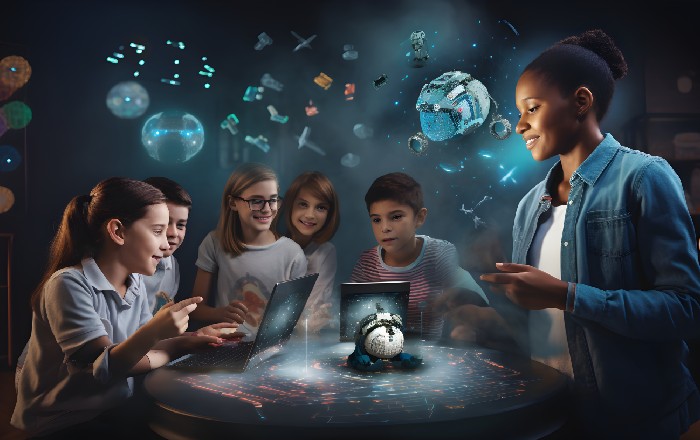Jan 16 2025
Seven Emerging EdTech Tools Revolutionising K-12 Classrooms in 2025

Director of Business Development

Jan 16 2025

Director of Business Development

The K-12 education sector is undergoing a seismic shift driven by innovations in EdTech. In 2025, immersive and collaborative tools are no longer optional; they’re essential for schools to provide engaging and effective learning experiences. Integrating K-12 learning solutions with digital curricula transforms classrooms into dynamic spaces that foster creativity, critical thinking, and collaboration.
According to a report by HolonIQ, EdTech is growing at 16.3% and will grow 2.5x from 2019 to 2025, reaching $404B in total global expenditure, driven by a rising demand for immersive learning for K-12 and digital transformation in education. With these tools, educators can bridge learning gaps, personalise education, and prepare students for a tech-driven future.
Read this blog for an in-depth look at the seven emerging immersive and collaborative tools that will transform K-12 education in 2025.
1. AI-Powered Personalised Learning Platforms
These platforms leverage artificial intelligence to analyse student data, identify individual learning styles and paces, and deliver K-12 course development tailored to each student’s unique needs. This personalised approach enhances student engagement and learning outcomes.
2. Extended Reality (XR) in Education
XR technologies including Virtual Reality (VR) and Augmented Reality (AR) are revolutionising immersive learning for K-12. They’re creating immersive learning environments that engage students in ways traditional methods cannot. Students can now embark on virtual field trips, conduct science experiments in simulated environments, and interact with historical figures in 3D, creating K-12 learning solutions that are both engaging and informative. These technologies support immersive learning for K-12 by providing hands-on experiences that enhance understanding and retention.
3. Gamified Learning Platforms
Gamification is transforming K-12 education by making learning fun and engaging. Gamification incorporates game mechanics such as points, badges, and leaderboards into the learning process, making education more fun and engaging. These platforms motivate students, enhance their problem-solving skills, and foster a competitive yet collaborative learning environment.
4. Collaborative Learning Platforms
Collaborative platforms such as Microsoft Teams for Education and Google Classroom are fostering teamwork and communication among students. These tools enable real-time collaboration for projects, discussions, and assignments, promoting a more interactive and engaging learning environment. By integrating these platforms into K-12 digital curricula, educators can enhance collaborative learning and prepare students for future teamwork scenarios.
5. AI-Driven Assessment Tools
AI-driven assessment tools transcend traditional multiple-choice tests to provide a more comprehensive assessment of student learning. These tools enhance the accuracy and efficiency of student evaluations. They can analyse student work, identify areas of strength and weakness, and provide personalised feedback, allowing educators to tailor their K-12 assessment solutions and K-12 content development accordingly. These tools use AI to automate grading, provide detailed feedback, and detect plagiarism. These tools also support K-12 assessment solutions by reducing the administrative burden on teachers and ensuring fair and consistent evaluations.
6. Blockchain for Secure and Transparent Education Records
Blockchain technology offers a secure and tamper-proof method for storing and managing student records, diplomas, and certifications. This enhances data security and facilitates the seamless transfer of academic credentials across institutions.
7. Learning Management Systems (LMS)
LMS platforms are centralising the management of digital curricula, assessments, and student data. These systems provide educators with tools to design, deliver, and track learning activities, ensuring that students receive a cohesive and structured education. LMS platforms also support K-12 assessment solutions by offering analytics and reporting features that help educators monitor student progress and identify areas for improvement.
At MRCC EdTech, we’re committed to revolutionising K-12 education through cutting-edge K-12 education solutions. Our tailored offerings help schools and institutions adopt immersive and collaborative tools effectively. Here’s how we contribute to shaping the future of K-12 learning:
Our K-12 digital curriculum solutions are designed to deliver interactive, accessible, and student-centred content. With innovative instructional design and multimedia elements, we create dynamic learning experiences that align with modern teaching methods.
1. Accelerating K-12 Content Development with MRCCWiz
Our flagship AI-powered platform MRCCWiz streamlines K-12 content development and automation. It simplifies processes like localisation, closed captioning, accessibility compliance, and assessment creation, enabling schools to deliver high-quality K-12 education solutions faster and more efficiently. While MRCCWiz does not directly focus on immersive learning, it complements these efforts by providing robust, scalable content development capabilities.
2. Netvidya: A Collaborative LMS
Netvidya, our advanced content distribution platform, ensures the seamless delivery of digital curriculum K-12 content. With features like intuitive organisation, easy access for educators and students, and real-time usage tracking, Netvidya makes content distribution efficient and effective. Schools can rely on it to ensure that the right resources reach the right learners at the right time.
3. K-12 Assessment Solutions
MRCC EdTech offers data-driven K-12 assessment solutions that help educators track student progress, identify learning gaps, and tailor instruction to meet individual needs. Our assessments are designed to align with state and district standards, ensuring measurable outcomes.
4. Immersive Learning for K-12
Our AR/VR-based immersive learning technologies for K-12 create engaging and interactive learning experiences. By incorporating these tools into the K-12 digital curriculum, we help educators bring subjects to life and provide students with hands-on experiences that deepen their understanding.
5. Gamified Learning Tools
We provide gamified learning tools that make education fun and engaging. By incorporating game elements into the curriculum, we help educators motivate students and improve learning outcomes.
Ready to transform your K-12 classrooms with cutting-edge immersive and collaborative tools? Contact MRCC EdTech today to learn more about our innovative solutions and how we can help you enhance your digital curriculum and improve your student outcomes. Let’s work together to create a brighter future for K-12 education.
Leave A Reply
Your email address will not be published. Required fields are marked *